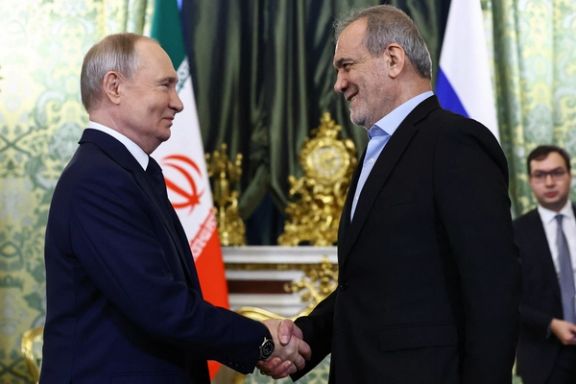Iranian President meets with Putin ahead of new pact

Iranian President Masoud Pezeshkian met with Russian President Vladimir Putin in Moscow on Friday to sign a long-term pact, widely regarded as a sign of the growing ties between the two countries.

Iranian President Masoud Pezeshkian met with Russian President Vladimir Putin in Moscow on Friday to sign a long-term pact, widely regarded as a sign of the growing ties between the two countries.
"Our enhanced relations will thwart the plans of those seeking to destabilize the region and impose their policies," Pezeshkian reportedly said in the meeting.
According to Iranian state-controlled media, Pezeshkian described Iran-Russia relations as sensitive and strategic, and stressed Tehran's commitment to deepening ties.
The comprehensive strategic partnership agreement, as it has been referred to, is seen as a means for Moscow and Tehran to navigate Western sanctions by strengthening their political and economic ties.
The 20-year-treaty, while not constituting a mutual defense pact as noted by the Iranian ambassador to Moscow, will formalize commitments to closer defense cooperation, according to the Russian foreign minister.
Pezeshkian also reportedly suggested that progress had been made on a joint project to build a new nuclear power plant in Iran.
"We have worked to remove barriers to expanding our relations," Pezeshkian added.
On his inaugural visit to the Kremlin since he was elected in July 2024, Pezeshkian was accompanied by a high-level delegation from the Islamic Republic, comprising ministers, senior officials, and a parliamentary representative.
"Iran is an important partner for us with which we are developing multifaceted co-operation," Kremlin spokesperson Dmitry Peskov told reporters ahead of Pezeshkian's meeting with Russian President Vladimir Putin.
The Kremlin previously said the pact would elevate the two state’s partnership to a strategic one.
The messaging from Tehran, including remarks by government spokesperson Fatemeh Mohajerani, sought to convey optimism, suggesting that the treaty will open “new horizons” for Iran-Russia relations.
In an interview with Russia's TASS ahead of the visit, the Iranian ambassador to Russia said that the pact would send a "clear signal" to other countries.
"The ability to cooperate between the two countries is a political issue to help advance international cooperation towards a new world order," Kazem Jalali said.
While Tehran has previously expressed its hope for accelerated cooperation in the North-South Corridor and the Russia-Iran gas transfer project – there has been little progress on Iran becoming an energy hub for Russian gas.
As several analysts have noted, the pact’s timing is a sign that Moscow and Tehran are bracing for Donald Trump’s return to the White House this month.
Hanna Notte, expert in arms control, security, and Russian foreign policy, said in a thread on X, that both countries have emerged as “losers” in the post-October 7,2023 Middle East, referring to the weakening of Iran's "axis of resistance" due to Israeli-led attacks and the fall of Syrian President Bashar al-Assad, a key ally to Russia and Iran.
“Both Russia & Iran see some utility in signaling the robustness of their partnership at this time - and that Trump won't be able to drive a wedge between them,” Notte wrote.
Nearly three years on, Russia's war on Ukraine continues, with Iran playing a key role as Moscow's ally in supplying drones and missiles. Iranian-made drones, including the Shahed series, have been crucial in Moscow’s attacks on Ukrainian infrastructure. Reports also suggest that Tehran provided ballistic missiles to enhance Russia's military capabilities.
Advisers to Trump, who takes office next Monday, are reportedly crafting a wide-ranging sanctions strategy to facilitate a Russia-Ukraine diplomatic accord in the coming months while at the same time squeezing Iran, people familiar with the matter told Bloomberg.